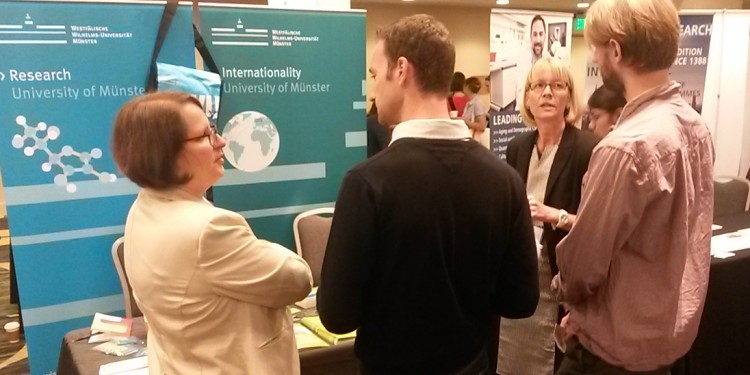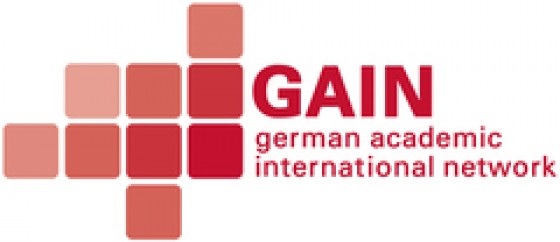
Speed-dating for bright minds with homesickness
Here a nice discussion among fellow students; at the next stand, some quick advice about the Emmy-Noether Programme – Matthias Fischer strolls with great composure through the "Golden Gate A" hall of the "San Francisco Marriott Marquis" hotel. The 32-year-old has already achieved what most of the young German academics who have also travelled to the West Coast are still dreaming of: he will take up a position as junior professor on 1 December, when he will strengthen the economics faculty at the University of Münster. "I had always thought and hoped", said the computer scientist, "that a scholarship in the USA and my studies in Ilmenau would give me the momentum to discover a new area of interest and to come back to Germany. That worked. My nomadic life has for now fortunately come to an end."
Academic speed-dating
Had Matthias Fischer not already signed his contract at the University of Münster a few weeks ago, he could have served as a perfect example for the conference organizers. For that is precisely the idea of "GAIN", the German Academic International Network: to bring postdoctoral students, universities, businesses, advisory services, foundations and extramural research institutions together, and allow them to benefit from each other. Behind GAIN are the Humboldt Foundation, the German Academic Exchange Service, the German Research Foundation, and a number of associate members – once a year, the team under programme director Dr. Gerrit Rößler offers a kind of academic speed-dating service in the USA, one year on the West Coast, and the following year on the East Coast. What began in 2001 as a straightforward meeting of scholarship holders in Palo Alto has now become, to the best of Gerrit Rößler’s belief, the largest conference for young German academics. "Where else do you have such a direct line to university rectors, vice-presidents and directors?" he asks. "Something like this doesn’t exist anywhere else." Johannes Bloos, Deputy Head of the Consulate General in San Francisco who invited to the reception on the eve of the opening of the GAIN conference on Jackson Street in the Pacific Heights neighbourhood, agrees. "The quality of what is offered here is unparalleled in the USA."
70 exhibitors in the basement
More than 70 exhibitors, including 41 universities, have taken their position in the "Golden Gate A Hall" in one of the two Marriott basements. Each has brought with them a two-metre-wide table on which staff have laid out, for example, brochures, flyers, pens, key chains, and job vacancies – most also have presentation walls behind them. At the University of Münster stand are Professor Cornelia Denz and Helga Soer-Sodmann answering questions. "An ideal constellation", says Cornelia Denz. "As Vice-Rector for International Affairs and Young Academics, I can represent in discussions the position of an academic and member of the Rectorate – Helga Soer-Sodmann, as Head of ,Safir’, our service centre for advice on research applications, is the ideal contact person from the administration."
Typical American friendliness
39 floors, 15 ballrooms, umpteen escalators between the levels, many shops and around 1,500 rooms: located on Mission Street/4th Street, Marriott Marquis has its own charm. In the lobby of the large hotel, it sometimes seems like one of the departure halls at Frankfurt airport. But staff, whether at reception or in the breakfast room, manage easily to make up for the rather impersonal atmosphere through their typical American helpfulness and friendliness. Whoever has heard of the Californian continuous drought only from television can now experience it at first hand: every guest who dispenses with the usual daily supply of new towels gets five US dollars a day credited to them, and can "squander" the money in a particularly spectacular way in the Sky Bar on the 39th floor.
Two days, 40 talks

What is the best strategy for returning?
In the afternoon, the young academics are given the opportunity to go to "subject-specific working groups". Physicist Cornelia Denz stands with four other academics in the room "Foothill G" and answers questions from those who especially want to learn about opportunities and risks in the natural sciences. At each of the five tables, 15 to 20 people gather to discuss. The questions are similar. Which job suits me best? Is my image of the German university landscape still accurate? Who provides a dual career service? What are the chances of an alternative career path – for example, in industry? What is the best strategy for returning to Germany? Sometimes it is the young junior colleagues who talk about their experiences – but primarily they hope to obtain from Cornelia Denz and the other university staff the most useful tips possible. "Always keep in mind alternatives to a professorship – whether in industry or in academic management", recommends Cornelia Denz. "Inquire about all possible funding means", she adds, naming the Emmy-Noether Programme, the Marie Curie Fellowship and the ERC Starting Grant as examples. "I’m learning a lot", reports a young woman about her first few months in the USA. "But I’m not gaining any management experience at all – I’m not even allowed to order something in the laboratory." Cornelia Denz can recommend something here, too. "Remember: Since you have come to the USA on a scholarship, you are costing the university here very little or nothing at all. So feel free to make one or two demands!"
Prospects for young academics
The young academics certainly do not lack praise, expressions of welcome, and promises of a bright future in the two days of the GAIN conference. "We need their experience in the two worlds and the academic systems that they have come to know", says the State Secretary at the Federal Ministry of Research, Cornelia Quennet-Thielen. "There is still a great deficit of permanent posts", says DAAD President Professor Margret Wintermantel. "But rest assured that moves are being made in the German academic system – I believe that we will find adequate solutions." We should also "not behave as if the path into the business world were something second-rate, only a plan B". According to Dr. Dorothee Dzwonnek, Secretary General of the German Research Foundation (DFG), two-thirds of GAIN participants want to return to Germany. "And I also want to encourage them", she tells her audience, and points as encouragement to the "many tenure-track models" at German universities. She says that the federal government will also be providing around one billion euros from 2017 to give active support to young academics.
Conclusions for the political domain
The tables have long been cleared. Cornelia Denz and Helga Soer-Sodmann are very satisfied: they have had plenty of conversations, and, as Helga Soer-Sodmann has observed, for most people that they talked to, the University of Münster is "a well-known and recognizably worthwhile goal". The last words to the plenary are granted to four members of parliament, who present their "conclusions for the political domain". The roundtable discussion takes approximately an hour. But those listening carefully can summarize all the contributions in a single sentence: much has changed for the better in the German academic system in recent years, but there is still some work to do for all those involved. Applause. "We’ll see", says a young neurologist, "if we find out at GAIN 2016 in Washington that politics has really paved the way for progress."
Author: Norbert Robers
